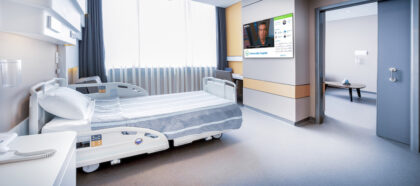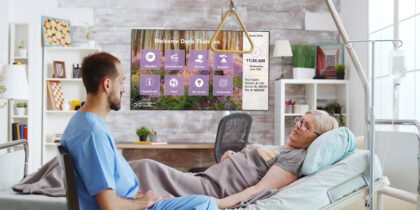Advancements in mobile technology now allow healthcare systems to be more efficient at solving issues, scaling information technology (IT) solutions and administering patient care. Due to the widening array of available solutions, from smartphones to wearable devices, healthcare providers are able to better select the right combination of tools and solutions for their practices. Because these solutions are easy to update and maintain, healthcare providers will spend less time managing IT and more time being efficient and engaging caregivers.
Mobile Healthcare Technology Addresses Key Challenges
Mobile healthcare technology offers providers a straight-forward solution to some of their most pressing challenges. So it comes as no surprise that healthcare providers are embracing mobile technology in their practices. In fact, the 2015 HIMSS Mobile Technology Survey found that 90 percent of employees at healthcare providers say that they are using mobile devices within their organizations to help patients.
One of the key challenges that IT departments can address is improving collaboration and communication across healthcare systems. The goal of mobile healthcare technology is to make an organization more streamlined and efficient, particularly among the variety of devices and systems an employee interacts with on a daily basis. For example, when a nurse uses a tablet to enter a patient’s symptoms, the information will be uploaded to their electronic health record for other providers to access. This way all nurses, doctors and specialists who treat this patient will have access to the same patient records.
Another challenge is that the IT budget must be aligned appropriately to account for these mobile technology solutions. Otherwise an organization won’t be able to have the right combination of tools necessary to complete the tasks at hand, nor will they be equipped to address other challenges. However, it is important to look at the total benefit of the devices to the organization. Mobile healthcare solutions, combined with effective security and device management, create new efficiencies and allow healthcare providers to reduce costs in other areas like travel, printing or communications.
Healthcare IT departments also face a growing need for security and regulatory compliance. According to a Ponemon Institute report released in February 2015, the frequency of medical identity theft rose 21.7 percent compared to the previous year’s findings. These events had an average expense of $13,500 to be resolved. The right mobile technology can help address these issues by digitizing compliance processes, simplifying complex systems and giving you more time to manage other challenges.
Steps to Empower Medical Practitioners With Mobile Technology
The first step toward embracing mobile technology is to understand the priorities of the organization and the specific uses and applications of these tools. Do you want to embrace open APIs to support third-party health applications? Do you want to harness the power of wearables to facilitate home healthcare? Do you want to use video conferencing to enhance the doctor-patient relationship? It’s important to map out the key opportunities that apply to your unique circumstances.
Once you’ve considered the areas that mobile technology can improve in your organization, it’s important to understand the range of partners, solution providers and tools that are at your disposal. Choosing the right options for your needs means determining the correct combination of mobile technology, which is a key consideration for addressing and preventing many of the above challenges.
After choosing the appropriate mobile technology solutions, the next step is to train your staff on the proper use of these devices, as they apply to specific use cases at your particular institution. The best of these mobile solutions should require little to no IT support after the initial setup and training.
To learn more about how mobile healthcare technology can improve patient care, take a look at our latest e-book “Mobile Technology is Making the Rounds.”








